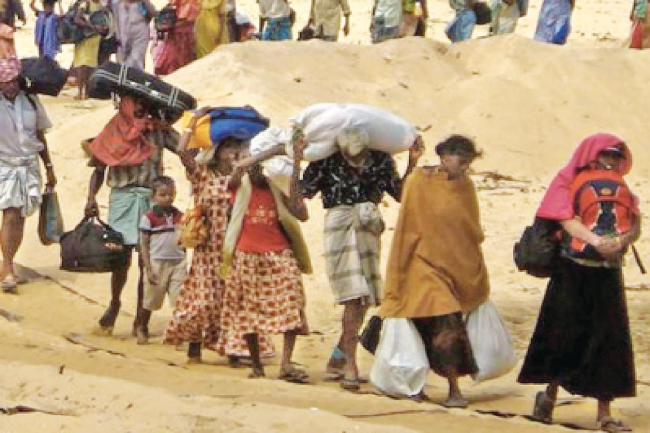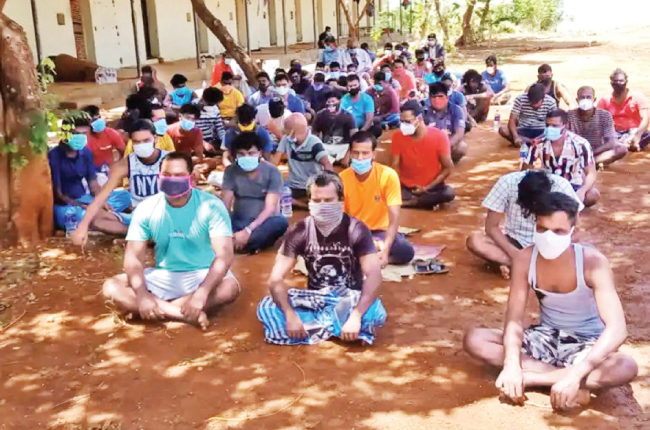Chief Minister M K Stalin of the ruling Dravida Munnetra Kalagam (DMK) in Tamil Nadu state has announced that the new Government to be formed in India following the Indian General Elections next month would grant Indian citizenship to the Sri Lankan Tamil refugees currently sheltered in India and in Tamil Nadu at large.
As the Indian General Elections are around the corner, the ruling DMK in Tamil Nadu has released its election manifesto announcing that the Government to be formed with the DMK’ s support in India would grant Indian citizenship to the Lankan Tamil refugees presently living in the State of Tamil Nadu.
According to reports from DMK led state Government the Lankan Tamils who had sought refuge in Tamil Nadu following the three decades of civil strife in Sri Lanka will not be considered as refugees anymore and they would be granted with the citizenship in India.
Special camps
In the early eighties thousands of people from war-torn areas in the North and East of Sri Lanka had crossed the Palk Straits and sought refuge in Tamil Nadu. The special camps were created in the southern coastal area of Rameswaram to provide shelter for the Lankan refugees from the North and East. The Tamil Nadu State Government sympathising with the Lankan refugees not only provided them with shelter, but also granted facilities for them to continue with their studies at the colleges and universities in the State.
However following the end of the civil war in the Island a significant number of Lankan Tamil refugees have also returned to their original places in the Island.
According to reports from Tamil Nadu, at present there are 58,200 Lankan refugees living in 104 camps across Tamil Nadu and over 33,200 of them are living outside the refugee camps.
Lankan Tamil refugees
Statistics have also revealed that 79% of them have stayed in India over 30 years. 7% have lived in India between 21 and 30 years.
Interestingly 8% of Lankan Tamil refugees have even married Indian citizens.
In the meantime Lankan Tamil refugees possessing their Indian identity cards known as ‘Aadhaar’ cards in Tamil Nadu would be given priority in obtaining the citizenship, reports said.
Even from Tamil Nadu several Lankan Tamils have also migrated to various countries in the West in the past reports said.
The three decades of civil strife in Sri Lanka even remained a key political issue in Tamil Nadu. Several leading political parties such as Dravida Munnetra Kalagam (DMK) and All India Anna Dravida Munnetra Kalagam (AIADMK) had competed with each other towards sympathising with the Lankan Tamil refugees for their political gains. Whereas for the outside world they created an image that they were sympathising with Lankan Tamil refugees on humanitarian grounds.

Innocent Lankan Tamil refugees were sheltered in the make shift camps in Rameswaram region. On the other hand Tamil militant outfits and their leaders were supported by whatever the State Governments which were in power until the assassination of former Indian Prime Minister Rajiv Gandhi in Sriperumbudur, in Tamil Nadu on May 21, 1991.
Financial support
Among the previous Tamil Nadu Chief Ministers late M G Ramachandran was very sympathetic towards the Lankan refugees and the Lankan Tamil militants. M G Ramachandran who was born in Kandy, Sri Lanka even met the LTTE leader V Prabhakaran and gave him the financial support and even directed the security top brass in Tamil Nadu not to meddle with Lankan Tamil militants or refugees.
It was the sympathetic outlook of the Tamil Nadu State Government had led to the Lankan Tamil militants particularly the Liberation Tigers of Tamil Eelam (LTTE) to stretch their wings widely in India.
Indian Coast Guards and Navy were also directed to be lenient over the gun running activities as well as the movements of the refugees through Palk Straits.
As far as the Lankan Tamil refugees who had sought asylum in Tamil Nadu were concerned they were in two categories. The badly affected people were from the areas directly hit by clashes between the Tamil militants and the Armed Forces in the coastal areas in the Jaffna Peninsula. They were the genuine refugees. Whereas others were utilising the conflict situation and fled to India as refugees to get their admissions at colleges and Universities in Tamil Nadu. Kith and kin of several North and East politicians had made use of the conflict situation well and truly to get their admissions at prominent educational institutions in Tamil Nadu and in New Delhi.
Higher educational institutions
The Indian State Government also provided them with special privileges to obtain admissions at the higher educational institutions in Tamil Nadu.
However the LTTE’s refusal to accept the Indo- Lanka Accord and the manner the outfit challenged the Indian Peace Keeping Forces in the North and East had changed the sympathetic outlook of the Indian Central Government towards the Tamil militants and later India was all out to see the premier militant outfit LTTE is rooted out completely from the Sub Continent following its involvement in the assassination of former Indian Prime Minister Rajiv Gandhi in 1991.
Former Tamil Nadu Chief Minister and film icon Jayalalitha Jeyaram who had taken over the leadership of the AIADMK following the demise of her political mentor M G Ramachandran adopted tough measures in rooting out the LTTE from Tamil Nadu completely.
However Jayalalitha was sympathetic towards genuine Lankan Tamil refugees sheltered in Rameswaram and stood by the peace measures introduced through Indo-Lanka Accord in the Island.
The parties in Tamil Nadu and in the Central Government in New Delhi would have had their differences with regard to their internal politics. However they were for the implementation of the Indo-Lanka Accord in Sri Lanka as well as for the devolution of powers to the North and East through the Provincial Council system which is in place with the 13th Amendment to the Sri Lankan Constitution.
Lok Sabha election
So Tamil Nadu Chief Minister M K Stalin’s DMK which remains as part of the coalition of Opposition parties formed by the Congress party led by Sonia Gandhi had made an attempt to convince the Tamil Nadu voters by expressing his views sympathetically towards granting the citizenships to Lankan Tamil refugees presently in India. Whereas first of all the Congress should be victorious in New Delhi to respond positively to the expectation of the Tamil Nadu Chief Minister. Secondly in recent years with refugees from Afghanistan, Myanmar and Bangladesh creeping into the Indian main land, India granting citizenships for Lankan Tamil refugees in Tamil Nadu could be considered a distant dream.
The Indian General Elections known as Lok Sabha election will be held from April 19 to June 1. The results would be announced on June 4.
The current BJP government led by Prime Minister Narendra Modi expected to be victorious according to the surveys done locally and internationally so far, reports said.
Ananth Palakidnar







